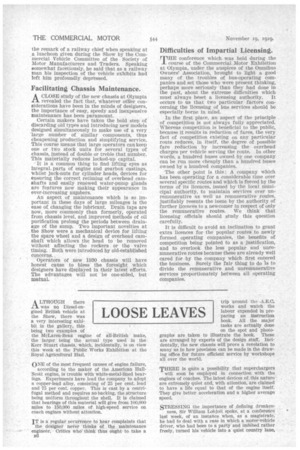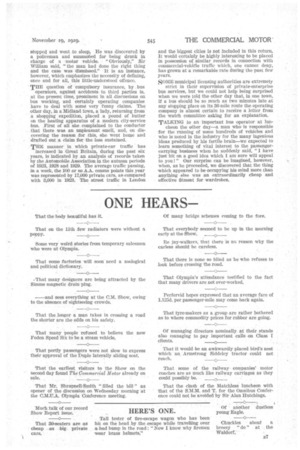LOOSE LEAVES
Page 40

Page 41

If you've noticed an error in this article please click here to report it so we can fix it.
A LTFIOUGH there Ili was no Diesel-engined British vehicle at the Show, there was a very interesting exhibit in the gallery, this being two examples of the MCLaren-Ben engine of all-British make, the -larger being the actual type used in the Kerr Stuart chassis, which, incidentally, is on view this week at the Public Works Exhibition at the Royal Agricultural Hail.
ONE of the most frequent causes of engine failure, according to the maker of the American Hall'Scott engine, is trouble with white-metal-lined bearings. Experiments have lead the company to adopt a copper-lead alloy, consisting of 25 per cent, lead and 75 per cent. copper. This is east by a centrifugal method and requires no backing, the structure being uniform throughout the shell. It is claimed that bearings of this material will give from 300,000 miles to 150,000 miles of high-speed, service on coach engines without attention.
IT is a regular occurrence to hear complaints that the designer never thinks Of the maintenance engineer. Critics whothink thus ought to take a B6 trip around the ,A.E.C. works and watch the labour expended in preDaring an instruction book. All the major tasks are actually done on the spot and photographs are taken to illustrate the book. These are arranged by experts of the design staff. Incidentally, the new chassis will prove a revelation to many as to how provision can be made in the drawing office for future efficient service by workshops all over the world.
THERE is quite a possibility that superchargers will soon be employed in connection with the engines of cOaelies. The latest devices of this nature are extremely quiet and, with attention, are claimed to have a life equal to that of the engine itself. They give better acceleration and a higher average speed.
STRESSING the importance of defining drunken ness, Sir William LobJoit spoke, at a conference last 'week, of an instance when as a magistrate, he had to deal with a case in Which a-mator-svehicle driver, who had been to a paitY and imbibed rather freely, turned his vehicle into a quiet country lane, stopped and went to sleep. He was discovered by a policeman and summoned for being drunk in charge of a motor vehicle. "Obviously," Sir William said, "the man had done the right thing and the case was dismissed." It is an instance, however, which emphasizes the necessity of defining, once and for all, this little-understood offence.
ITIE question of compulsory insurance, by bus operators, against accidents to third parties is, at the present time, prominent in all discussions on bus working, and certainly operating companies have to dell' With some very funny claims. The other day, in a Midland town, a lady, returning from a shopping expedition, placed a pound of butter on the heating apparatus of a modern city-service bus. .First of all she complained to the conductor that there was an unpleasant smell, and, on discovering the reason for this, she went home and drafted out a claim for the loss sustained.
THE manner •in which private-car traffic has increased in Great Britain, during the past six years, is indicated by an analysis of records taken by the Automobile Association in the autumn periods of 1923, 1928 and 1929. The average traffic passing, in a week, the 100 or. so A.A. census points this year was represented by 17,000 private, cars, as compared with 3,000 in 1923. The street traffic in London and the biggest cities is not included in this return. It would certainly be highly interesting to be placed In possession of similar records in connection with comraercial-velikqe traffic which, one cannot deny, has grown at a remarkable rate during the past few years.
SOME municipal licensing authorities are extremely strict in their supervision of private-enterprise bus services, but we could not help being surprised when we were told the other day that, in one town, if a bus should be so much as two minutes late at any stopping place on its 36-mile route the operating company is almost certain to receive a letter from the -watch committee aSking for an explanation.
TALKING to an important bus operator at lun cheon the other day—a man who is responsible for the -running of some hundreds of vehicles and who is noted in the industry for the many ingenious ideas produced by. his fertile brain—we expected to learn something of vital interest to the passengercarrying business when he suddenly said, " I have just hit on a good idea which I am sure will appeal to you!" Our surprise can be imagined, however, when, as he proceeded, we discovered that the thing which appeared to be occupying his mind more than anything else was an extraordinarily cheap and effective fitment for wardrobes.




















































































































